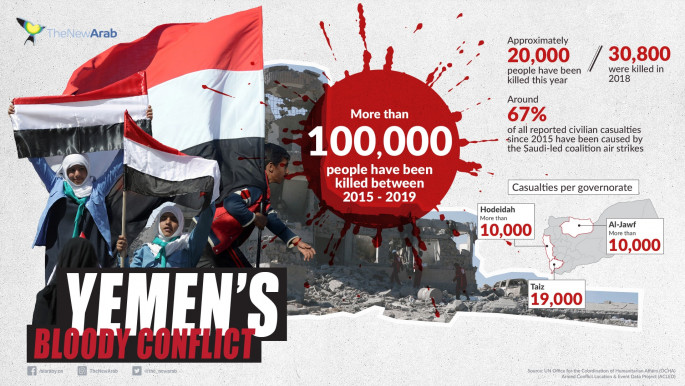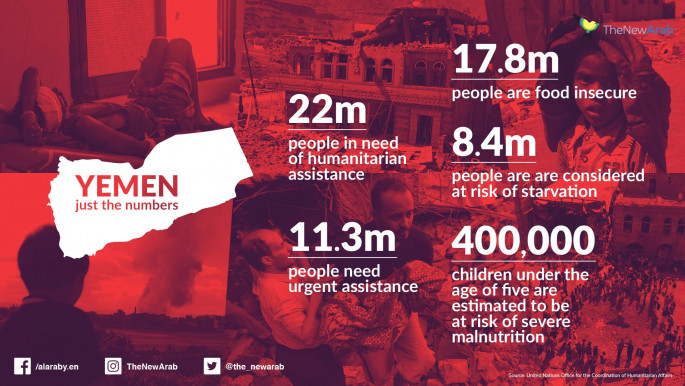Yemen in Focus: Pirates of the Arabian? Houthis seize Saudi vessel in latest peace blunder
The move, slammed as a "serious escalation" by the Saudi-led coalition, marks the first time the rebels' expanded their military activities off the coast of Yemen, though they have been accused of targeting ships with missiles previously.
"On Sunday, during the sailing of the tugboat Rabigh-3 in the southern Red Sea, it was hijacked and subjected to armed robbery by terrorist elements affiliated to the Houthi militia," Saudi-led coalition spokesman Turki al-Maliki said.
"The boat was towing a [marine rig] owned by a South Korean company," Maliki said in a statement posted on the official Saudi Press Agency.
Colonel Wathah Al-Dubaish, a key member of the coalition said: "The Houthi militia seized a South Korean ship carrying drilling equipment and its 28-person crew, which is formed of different nationalities, and a Saudi Arabian oil tanker carrying 500,000 barrels of oil and its crew."
The Korean vessel was reportedly taken an area at the southern end of the Red Sea, where it is currently being held by the Houthis, the rebels confirmed.
"Yemeni coast guards... are checking to see whether (the vessel) belongs to the countries of aggression or to South Korea, in which case it will be released after completing legal procedures. The crews are being well treated," Houthi official Mohammed Ali Al-Houthi told Reuters.
The move comes amid reports that Saudi Arabia had established open, though informal, channels to cultivate dialogue with the Houthi rebels, according to Reuters.
The initiative followed a Houthi offer to halt cross-border missile and drone attacks on Saudi cities if the coalition ended airstrikes on Yemen, sources said last week.
Another source suggested "discussions on finalising the security pact are moving very quickly now through a number of channels", however Riyadh still had concerns about its border security.
 |
Reports of new efforts to bring the warring factions to the table was also confirmed by the Houthis, though an official warned the group's patience was "wearing thin".
Meanwhile, a Saudi official dismissed claims of new channels, saying the kingdom was merely re-engaging in already established communications.
"We have had an open channel with the Houthis since 2016. We are continuing these communications to support peace in Yemen," the Saudi official said.
Last week, the UAE's minister of state for foreign affairs, Anwar Gargash made unusual friendly gesture to the Houthis, who he claimed should have a role in Yemen's future.
The comments are the latest conciliatory development in the long-running Yemen conflict, after the Houthis offered to halt attacks on Saudi Arabia in September, and a deal was signed in Riyadh last week between the government and separatists in the south.
The government returns
Those reports came shortly prior to the arrival of Yemen's government to Aden on Monday, which saw Prime Minister Maeen Abdulmalik Saeed and four other ministers land in the temporary capital after multiple delays.
The return of the government from Riyadh, initially planned for last week but delayed for logistical reasons, follows the November deal with separatists who had chased the government out of the port city.
Abdul Malik has been residing in Saudi Arabia since the separatist Southern Transitional Council takeover of Aden.
The return has been delayed more than once over the past few days, with sources saying that the wait was due to security arrangements.
Earlier this month, Yemen's UAE-backed southern separatists signed a landmark power-sharing deal with the government.
Despite the Riyadh agreement, however, the separatists have reportedly hindered the return of the government, including by refusing to raise the country's national flag over key government institutions in the city.
The return date for the government stipulated in the Riyadh agreement had been last Tuesday.
The deal aims to give the STC given control of a number of ministries and 50 percent of posts in the country's cabinet after years of discontentment in the south.
Read also: Yemen in Focus: UAE changes its tune on Houthi rebels following Riyadh agreement
The crisis of infighting heightened in August after separatists led a coup against the Saudi-backed Hadi government, taking military control of Aden and prompting clashes which saw dozens killed and injured from both sides.
UAE-backed Security Belt Forces, which is dominated by the STC, took control of Aden – a southern coastal city that had served as the beleaguered government's base since it was ousted by the Houthi rebels in 2014.
The clashes between the separatists and government forces, who for years fought on the same side against the Houthis, had raised fears the country could split into two entities.
Read also: Comment: UAE's true ambitions in Yemen take another blow
The STC then expelled internally-displaced Yemenis from the north of the country seeking refuge from the ongoing violence.
The Yemeni government has on several occasions accused Abu Dhabi of being behind what it called an "insurgency".
The warring factions in recent weeks held indirect talks mediated by Saudi Arabia in the kingdom's western city of Jeddah, which culminated in the deal signed in Riyadh.
Saudi Crown Prince Mohammed bin Salman has said the deal would "open a new period of stability in Yemen."
The UN special envoy for Yemen, Martin Griffiths, said it was "important to the political efforts to achieve peace in the country."
More Sudanese losses
However, Yemen's rebels had other things planned this week.
An attack by the Houthis killed six members of a Sudanese paramilitary force that has been fighting with the Saudi-led coalition in Yemen since 2015, Sudanese officials said.
The officials said the attack, which occurred earlier this week, targeted a position on the Saudi-Yemen border held by Sudan's paramilitary Rapid Support Forces (RSF).
Led by General Mohammad Hamdan Dagalo, the RSF is an officialised offshoot of the notorious Janjaweed militias accused of war crimes in the Darfur conflict.
Dagalo, better known by his nicknamed Hemedti, has mobilised thousands of recruits to fight in Yemen on behalf of the Saudi-led coalition, over the past years.
The Sudanese forces, which allegedly include child soldiers, have been deployed mainly to Yemen's northern province to repel any attacks by the Houthi rebels directed at Saudi Arabia.
The Sudanese troops were on patrol in the frontier area on Wednesday when they were attacked by the Iran-linked Houthis, officials told AFP on condition of anonymity. At least three others were wounded in the deadly attack.
Meanwhile, the United Arab Emirates said on Wednesday an attack on the Saudi-Yemen border killed one of its soldiers. It is unclear if the Sudanese troops were killed in the same attack, which took place in Saudi Arabia's Najran region.
A spokesman for the Saudi-led coalition did not return a request for comment by AFP.
The attack comes amid increasing speculation that Sudan may soon pull its troops from the conflict.
Both Abu Dhabi and Khartoum have pulled out troops in recent months but neither have committed to quitting the war.
At home, however, the involvement of Sudanese troops in Yemen is deeply unpopular, with protesters having demanded the withdrawal of soldiers during mass demonstrations earlier this year.
It is estimated that hundreds or even thousands of Sudanese have been killed in fighting in Yemen. According to a report by The New York Times last year, children may even be among the dead.
Riyadh allegedly offered impoverished Sudanese families up to $10,000 to send their children to fight in Yemen. Saudi Arabia has officially denied the reports.
The report said that children made up at least 20 percent – and sometimes 40 percent – of the Sudanese battalion in Yemen.
Many had been brought in from the Darfur region of the west of Sudan, where some 300,000 people were killed and 1.2 million displaced during years of conflict.
But, despite calls from Sudanese protesters and opposition politicians to withdraw troops, analysts are unsure whether the move will be realised while Hemedti, a staunch ally of Riyadh, remains in power.
Sana Uqba is a journalist at The New Arab.
Follow her on Twitter: @Sanasiino
Yemen In Focus is a new, regular feature from The New Arab.



